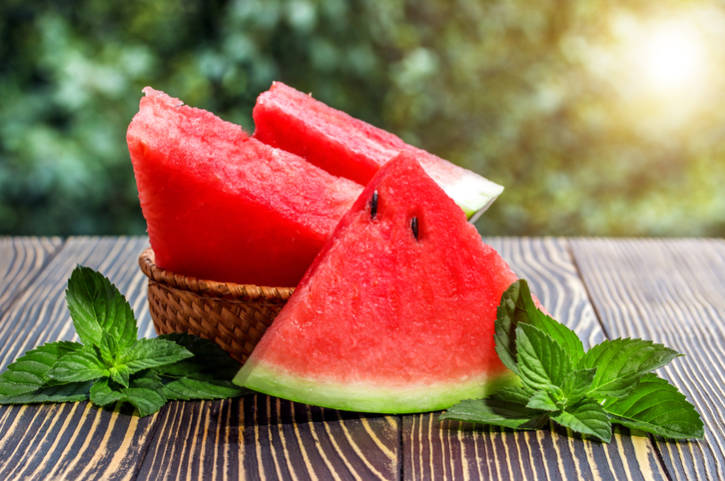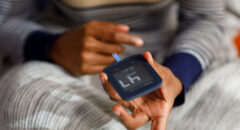 Who doesn’t love a cool refreshing slice of watermelon during the warm summer months? Many people with diabetes think watermelon is off limits because it’s “too sweet” and is loaded with sugar. It’s true that all fruit contains sugar and some more than others, but that doesn’t mean you should avoid fruit.
Who doesn’t love a cool refreshing slice of watermelon during the warm summer months? Many people with diabetes think watermelon is off limits because it’s “too sweet” and is loaded with sugar. It’s true that all fruit contains sugar and some more than others, but that doesn’t mean you should avoid fruit.
RELATED: 5 Amazing Facts About Watermelon: Nature's Most Powerful Food
“If you have diabetes and enjoy watermelon, you can incorporate it into your diet," says New York-based registered dietitian Susan Weiner, MS, RD, CDN, CDE, author of The Complete Diabetes Organizer: Your Guide to a Less Stressful and More Manageable Diabetes Life.
Experts agree that there’s more to watermelon than good taste. In fact, watermelon is often referred to as a nutrient powerhouse. Like most fruit, watermelon is naturally low in fat, sodium, and calories. Watermelon is packed with many essential nutrients including potassium, vitamin C, folate (folic acid) and dietary fiber.
Weiner says, “Fiber can help keep you fuller longer, which may help you eat less, and aide in weight loss. Fiber can also help regulate your digestive tract and prevent constipation.”
What sets watermelon apart from other fruit is lycopene – the pigment that gives watermelon its pinkish color. Lycopene is a potent antioxidant linked to many health benefits. “Studies show lycopene may reduce the risk of cardiovascular disease and other circulatory disorders such as atherosclerosis – hardening of the arteries,” says Weiner. Other studies suggest lycopene may help reduce blood pressure and reduce the risk of developing certain cancers.
Watermelons’ Glycemic Index
In conversations about watermelon and diabetes, one can’t help but discuss the glycemic index (GI). That's because watermelon has a glycemic index of 76 that is considered high. The GI is a measurement of how fast a particular carbohydrate raises blood sugar as compared to a standard amount of glucose. A standard amount of glucose will raise blood sugar faster than any other food and is rated as 100.
“As a reference point, the glycemic index (GI) assigns a value of between 1 and 100 to foods, based on how fast sugar from that food enters the blood stream. Foods are compared to glucose or white bread; 55 or less is a low GI, 55-69 is medium, and 70-100 is high,” says Weiner.
Foods with a high GI will raise your blood sugar quickly, while a low GI food, which is absorbed more slowly, will raise your blood sugar more slowly.
However, the glycemic load is a much better indicator of how food will affect your blood sugar. The glycemic load describes the quality and quantity of carbohydrate in a serving of a particular food. Ten or less is low, 11 to 19 moderate and 20 or more is a high glycemic load.
Generally, healthy food choices include low GI foods. However, there are many nutrient-rich foods such as watermelon with a high GI and a low glycemic load. Watermelon has a GI of 76, but 1 cup has a glycemic load of 8.
Selection and Storage Tips
Red, ripe flesh is the best indicator of the sweetest and most nutritious watermelon. As watermelon ripens, the lycopene content becomes more concentrated. To get the most lycopene benefits from watermelon, make sure your melon is ripe.
When selecting watermelon choose one with a symmetrical shape that is heavy for size. A fully ripened watermelon will feel heavy for its size. Also, look for dried stems and a yellowish underbelly. If purchasing pre-cut watermelon choose pieces with the deepest red color flesh and no white streaking.
Store whole melon at room temperature. Cut watermelon should be stored refrigerated in an airtight container for use within five days.
Bottom Line
Watermelon is a nutritious fruit that can be included in a healthy diet. If you have diabetes and are concerned about eating watermelon Weiner suggests you speak to your healthcare provider or dietitian about fitting it into your meal plan. Click here to find a registered dietitian nutritionist near you.
 Constance Brown-Riggs, MSEd, RD, CDE, CDN is a registered dietitian, certified diabetes educator, national speaker and author of The African American Guide to Living Well with Diabetes.. She is Dannon One Yogurt Every Day Nutrition Advisor.
Constance Brown-Riggs, MSEd, RD, CDE, CDN is a registered dietitian, certified diabetes educator, national speaker and author of The African American Guide to Living Well with Diabetes.. She is Dannon One Yogurt Every Day Nutrition Advisor.








